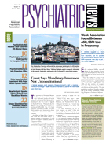What year is this? Screening elderly patients for dementia or delirium may be as simple as asking them this question, said researchers at the Department of Geriatric Medicine of the Merlin Park University Hospital in Galway, Ireland, in the May Journal of Neurology, Neurosurgery, and Psychiatry.
They made this determination by evaluating a sample of patients aged 65 or older on the general medical wards of a university teaching hospital and among those attending the hospital's geriatric outpatient clinics from September 2009 to November 2009.
They used two approaches to assess cognitive impairment, as measured by the severity of a subject's temporal disorientation. In the additive approach, a single error point was given for any error in year, month, date, day of the week, or time, and these were summed to give an overall score from 0 to 5. For the weighted approach, investigators calculated the Benton Temporal Orientation Scale (TOS).
Each patient was assessed separately by two physicians on the same day (patients with major communication difficulties, those considered by their doctors or nurses to be too sick to be questioned, and those who were unwilling to participate were excluded). All of the patients were subsequently interviewed independently by an experienced clinician who determined whether they had cognitive impairment (delirium or dementia or both).
Lead investigator Shaun O'Keeffe, M.D., explained the impetus for the study: "Although assessment of temporal orientation is a mainstay of cognitive testing and may be the only aspect of cognition assessed by clinicians without a special interest in cognitive problems, there has been little work examining how best to interpret and score orientation errors and whether the severity of temporal disorientation is a rough measure of severity of cognitive impairment," he told Psychiatric News.
The study's findings confirmed the value of testing temporal orientation in older hospital patients and established useful cutoffs for identifying dementia or delirium in this group. "Disorientation to time is a useful guide to the presence and severity of dementia or delirium in older hospital patients," said the researchers. "Failure to identify the year or month correctly is a sufficiently sensitive and specific indicator of dementia or delirium to warrant more detailed cognitive assessment in this population."
An incidental finding was that there was a strong relationship between the duration of hospital stay and both the presence and magnitude of errors in identifying the date and day of the week, but "this is not surprising given the relative absence of usual social and environmental cues during prolonged hospitalization," they said.
The authors acknowledged that although the TOS remains the best standardized psychometric test of temporal orientation, the complexity of the scoring system is a disadvantage and noted that their results suggest that reliance on year-error scores alone might be a simple alternative in an older population.
"The study confirmed our intuition that errors in knowing the year or the month are more significant than mistakes such as misstating the day of the month by a day or two," said O'Keeffe. "It was striking that the magnitude of error in knowing the year was reasonably predictive of more detailed assessment of severity of cognitive impairment."
An abstract of "Orientation to Time as a Guide to the Presence and Severity of Cognitive Impairment in Older Hospital Patients" is posted at <www.ncbi.nlm.nih.gov/pubmed/20852313>. 